Gordon Brown Bankrupts Britain to Win Next Election
ElectionOracle / UK General Election Nov 23, 2008 - 03:02 AM GMTBy: Nadeem_Walayat

 The UK economy is fast falling over the edge of the cliff by registering a GDP contraction of 0.5% in the 3rd quarter with the expectations of a fall of between 0.5% and 0.7% for the fourth quarter which would put the UK officially in recession. With worse to come during 2009 and all of the governments golden rules now well and truly busted following the bank bailouts, Gordon Brown has now thrown caution to the wind so as to meet the primary goal at any cost to win the next election for which the June 2010 deadline looms.
The UK economy is fast falling over the edge of the cliff by registering a GDP contraction of 0.5% in the 3rd quarter with the expectations of a fall of between 0.5% and 0.7% for the fourth quarter which would put the UK officially in recession. With worse to come during 2009 and all of the governments golden rules now well and truly busted following the bank bailouts, Gordon Brown has now thrown caution to the wind so as to meet the primary goal at any cost to win the next election for which the June 2010 deadline looms.
On Monday, Gordon Brown's Darling chancellor will announce emergency tax cuts in the region of £20 billion to get consumers spending during the Christmas period and advance of further announcements of tax cuts in the March budget of at least a further £25 billion, thus would escalate the already worsening budget deficit by £45 billion, which under normal circumstances would be shockingly high spending, however following the £500 billion cash hand out to the banking sector and the combined nationalisation of Northern Rock and Bradford and Bingley amounting to an estimated £120 billion, further spending of £45 billion is but a mere drop in the UK's fast expanding debt mountain.
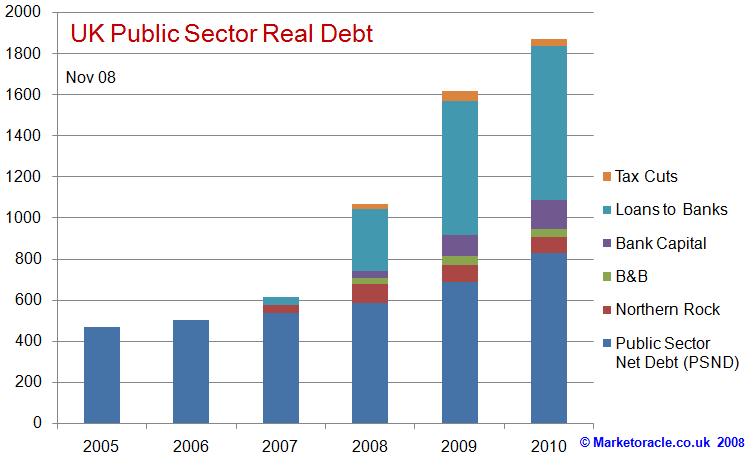
UK real public debt is expected to soar far beyond the 2007 level of £614 billion towards an estimated £1,065 billion this year. This would put UK debt at an eye watering 81% pf GDP up from 46% of GDP in 2007. However worse is to come in 2009 and 2010 as the UK economy contracts and the short-fall between tax revenues and government spending is met by ever more government spending.
In addition to this the government will be forced to lend the bankrupt banking sector an additional £350 billion in loans and guarantees and another £50 billion in capital injections, as the true extent of bank losses due to their exposure to the deleveraging derivatives market could run to over £1 trillion of which the banks have so far barely scraped the surface off in terms of announced losses to date, these loans will not be repaid anytime soon and should be added to the countries balance sheet rather than the use off balance sheet accounting practices that is more or less how the banks originally got into difficulties in the first place with their own off balance sheet accounting practices to hide the extent of exposure to the over the counter derivatives.
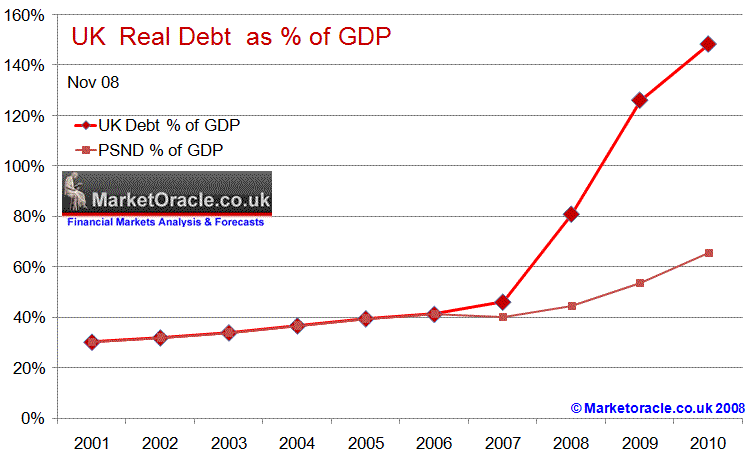
Even if one used the governments preferred measure of recording public sector net debt that excludes all of the bailouts and nationalisations to date, this still shows that UK government debt will rise to 54% of GDP by the end of 2009 and bust through 60% of GDP by the end of 2010. However taking account of the bailouts and nationalisations government debt by the end of this year will sit at 81% of GDP, rising to 126% of GDP by the end of 2009, onward and upwards to 148% of GDP by the end of 2010.
Sterling Crash
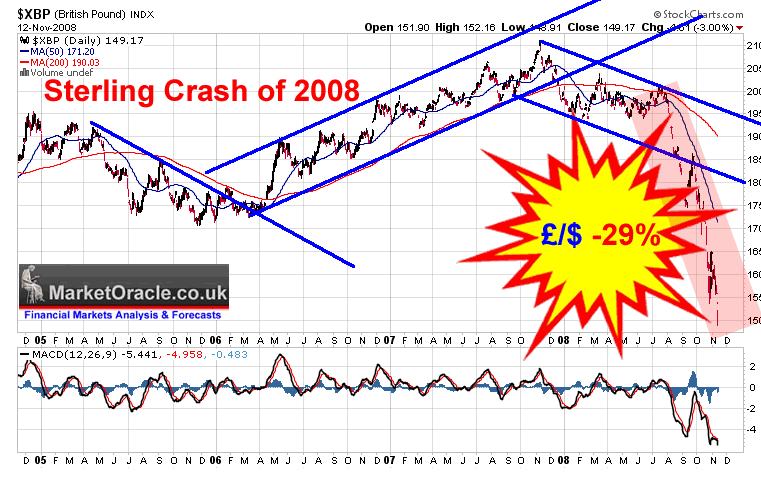
Whilst undoubtedly consumers and tax payers will enjoy the tax cuts in the coming weeks and months, however Britain has already paid a high price for the borrowing which has manifested itself in the crash of sterling of 2008. Which is highly inflationary in the long run and ensures that Britain is heading for many years of stagflation following the deflationary bust of 2009 which means low economic growth coupled with high interest rates and high inflation as the country forced meet the consequences of servicing the increased debt burden.
Deflation Now Inflation Later
UK inflation as measured by the CPI slumped by the largest amount since the series began in 1997, falling from 5.2% to 4.5%. This follows hard on the heels of the Bank of England's panic 1.5% interest rate cut earlier in the month which was accompanied by BOE statements that UK economy would contract by 2% GDP during 2009, that puts the UK on target to experience a worse recession than that of the early 1990's as Gordon Browns boom turns to bust. The RPI measure which the BoE also warned was heading towards deflation i.e. a negative RPI during 2009 fell sharply from 5% to 4.2%.
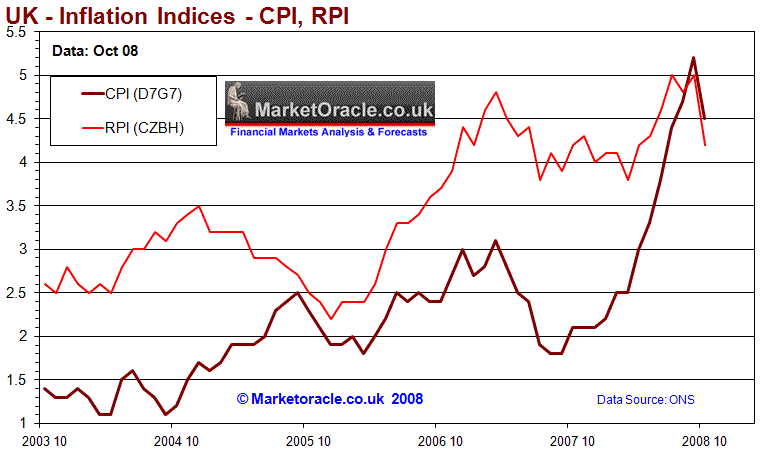
Deflation has not been seen in the UK since the 1930's Great Depression. The effect of deflation are worse than inflation as a deflationary spiral brings investment to a halt and the value of debts increases in real terms as wages contract, leaving borrowers worse off than people have experienced during the previous recessions of the post war period. The deflationary trend of late 2008 and 2009 was first warned of by myself way back in March 2008 - DELEVERAGING- Gold and Commodities Teetering on the Brink of a Bear Market? , the trend for which is now coming to pass as virtually all commodities have slumped following their forecast summer peaks.
Retail Sales Deflation
Whilst official data suggests positive retail sales of 2% year on year as though everything remains rosy on the high streets, the real state of the UK high street as per trend and inflation adjusted data illustrates a slump in retail sales activity that is contracting at the rate of -1.8% year on year and reflects the actual state of the retail sales market. This trend is expected to continue deteriorating for the duration of the recession as more retailers report losses and in fact go out of business.
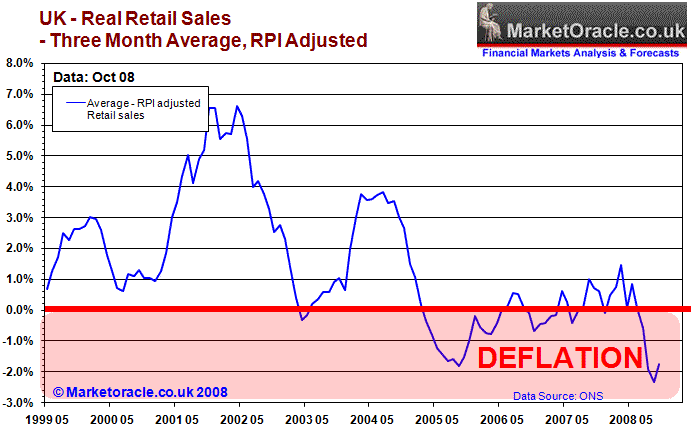
More Bargains Coming for Shoppers
The outbreak of panic sales of 20% plus off marks just the first stage of the consumer bust of 2009. Shoppers can expect more discounting the closer we get to Christmas, followed by deeper cuts during the January sales and later in 2009 by the 70% to 80% price cuts in the CLOSING DOWN SALES as many retailers go bust.
Bankrupting Britain?
Unlike the 1990's the continuing crash in sterling will not be met by government intervention as the lessons have been learned that the government cannot beat the market, as George Soros illustrated during Sterling's ejection from the Exchange Rate Mechanism, therefore the decline in sterling will be sustained until the economy strengthens in relative terms and the debt has been brought down inline with other major countries.
However the risk is that foreign investors take fright at the soaring amount of government debt being sold i.e. government bonds and stop buying gilts, which would send interest rates soaring and the currency plunging, igniting hyper inflation, which would put is more or less on a similar path to Iceland, where the country has come to a standstill in economic terms as no one wants to do business in the Icelandic Krona so the country is unable to import goods necessary for its survival triggering a downward hyperinflationary economic spiral in which Icelanders are witnessing their life savings all but wiped out.
Given the amount of true debt the government is likely to wrack up over the next 2 years there is serious risk of expected stagflation turning into a hyper inflationary bust that could push inflation well above what we have experienced over the last few months, i.e. to above 10% per annum, but more on in this in the imminent inflation forecast.
UK Election Mid 2009
The current severe deflationary price trend gives the government a window of opportunity to embark on an electioneering spending binge without worrying about the immediate consequences in terms of igniting inflation.
Although tax cuts and stimulus packages are at best only likely to delay the evitable by giving a short lived lift to the economy and feel good factor for traditional labour voters i.e. from the low paid to middle England. Therefore this suggests a last throw of the dice by Gordon Brown gamble on riding the consumer spending wave into an mid 2009 election probably during April or May 2009, as neither the £20 billion give away expected on Monday, nor the further £20 billion package of March 2009 be able to prevent the inevitable bust which is as a consequences of the deleveraging of the huge $500 trillion derivatives monster that seeks to claim most of the worlds biggest banks and looks set to claim formerly the worlds biggest bank Citicorp within the next few weeks as the banks share price collapses to less than 3% of its high as the bank looks set to be nationalised by the U.S. Treasury.
As mentioned earlier a delayed election into mid 2010 would imply far higher government borrowing with the associated risk of igniting a collapse in sterling and a hyper inflationary bust in subsequent years, which strongly suggests that Gordon Brown is eyeing an Mid 2009 election as the electorate will have by then been doused with some £40 to £50 billion of give away's, rather than attempting to boost the economy into June 2010 that would cost an estimated extra £300 billion in both government spending and support of the financial sector.
However at this point in time there exists no election speculation amongst the labour party circles, which is not surprising given the fiasco of October 2007, when Gordon Brown led the country to believe there would be an election only to bottle out later. This time the strategy is to lay the ground for an mid 2009 election whilst denying any speculation surrounding an election. So silence or denials of an election this early on are not to be taken seriously.
The real economic pain will follow hard on the heels of the next election no matter who wins, as the options available at that time will be limited given the literal doubling of government debt to over 80% of GDP which will mean tax rises and spending cuts as for every penny that Chancellor Darling announces on Monday and early next year will be recouped twice more during 2010 and which has been aptly labeled by the conservatives as a 'tax con'. In plain English, a £45 billion tax cut means a £90 billion tax hike later, due to the widening in the gap between revenue and spending, especially as after an election the government will have a window of at least 2 years for bad news in advance of creating the conditions for the boom leading up to the following election.
For the latest in depth analysis and forecasts on the UK economy, interest rates and housing market subscribe to our always free newsletter.
By Nadeem Walayat
http://www.marketoracle.co.uk
Copyright © 2005-08 Marketoracle.co.uk (Market Oracle Ltd). All rights reserved.
Nadeem Walayat has over 20 years experience of trading derivatives, portfolio management and analysing the financial markets, including one of few who both anticipated and Beat the 1987 Crash. Nadeem's forward looking analysis specialises on the housing market and interest rates. Nadeem is the Editor of The Market Oracle, a FREE Daily Financial Markets Analysis & Forecasting online publication. We present in-depth analysis from over 150 experienced analysts on a range of views of the probable direction of the financial markets. Thus enabling our readers to arrive at an informed opinion on future market direction. http://www.marketoracle.co.uk
Disclaimer: The above is a matter of opinion provided for general information purposes only and is not intended as investment advice. Information and analysis above are derived from sources and utilising methods believed to be reliable, but we cannot accept responsibility for any trading losses you may incur as a result of this analysis. Individuals should consult with their personal financial advisors before engaging in any trading activities.
Attention Editors and Publishers! - You have permission to republish THIS article. Republished articles must include attribution to the author and links back to the http://www.marketoracle.co.uk . Please send an email to republish@marketoracle.co.uk, to include a link to the published article.
Nadeem Walayat Archive |
© 2005-2022 http://www.MarketOracle.co.uk - The Market Oracle is a FREE Daily Financial Markets Analysis & Forecasting online publication.


